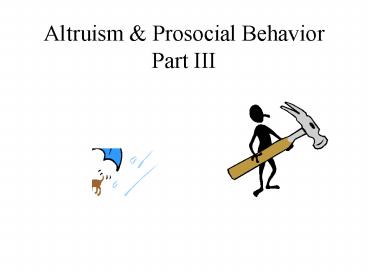Altruism - PowerPoint PPT Presentation
1 / 14
Title:
Altruism
Description:
Altruism & Prosocial Behavior. Part III. Exercise. 1. Go to ... Theoretical Explanations for Prosocial Behavior: Empathy-Altruism Hypothesis. Observe Emergency ... – PowerPoint PPT presentation
Number of Views:112
Avg rating:3.0/5.0
Title: Altruism
1
Altruism Prosocial BehaviorPart III
2
Exercise
- 1. Go to www.yale.edu/implicit/
- Complete the Race IAT
- Complete the Gender IAT
- Print your results to turn in on Tuesday
3
Theoretical perspectives on helping behavior
Prosocial behavior any act intended to help
others regardless of the helpers motives
Altruism acts intended to help others with no
expectation of personal gain
4
Perspective II
- Social Norms
- norm of
- help those
- norm of
- help those
- norm of
- rules about
Prosocial behavior
Altruism
5
Socio-Cultural Research
Reciprocity Norm Study
Prosocial behavior
Altruism
6
Perspective IV
- Cognitive/Decision-Making Steps
Prosocial behavior
Altruism
7
Need Perception
- interpretation is vital
- cues for interpretation as emergency
Prosocial behavior
Altruism
8
Need Perception Research
Prosocial behavior
Altruism
9
Personal responsibility
Social-cognitive Perspective
Prosocial behavior
Altruism
10
Need Perception
Costs/Benefits Assessment
Social-cognitive Perspective
- consider the
Help
Not Help
Prosocial behavior
Perceived Profits
Perceived Profits
Altruism
11
Theoretical perspectives on helping behavior
Social-cognitive Perspective
- Cognitive/Decision-Making Steps
Need Perception
Personal Responsibility
Prosocial behavior
Costs/Benefits Assessment
Altruism
What Help and How
12
General Determinants of Behavior
Behavior
13
Specific Determinants of Prosocial Behavior
Personal Factors
Situational Factors
Personal Factors
Behavior
Prosocial behavior
Personal Factors
Personal Factors
Altruism
Situational Factors
Situational Factors
Personal Factors
14
Theoretical Explanations for Prosocial Behavior
- Explanation Motivation Reason for
helping
Empathy-Altruism Hypothesis Observe Emergency
Negative- State Relief Model Observe Emergency
Empathic Joy Hypothesis Observe Emergency
Genetic Determinism Model Observe Emergency

